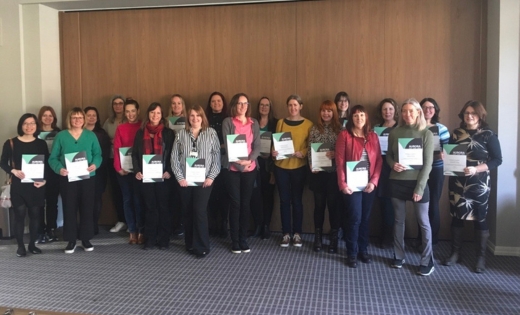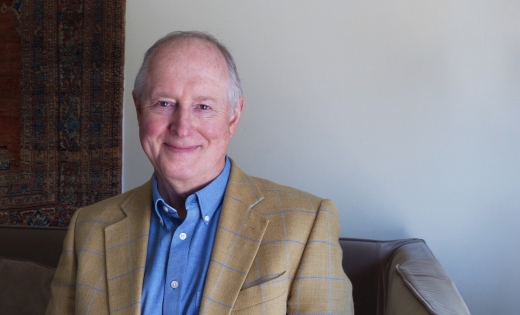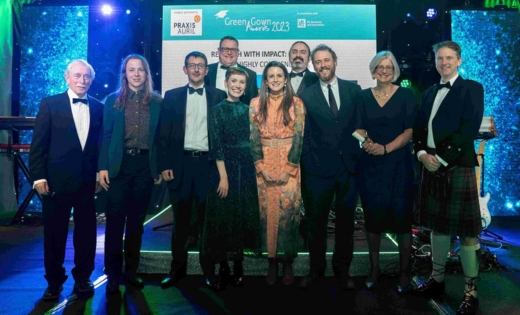Celebrate Our Staff – November 2023
Join us as we celebrate our colleagues’ achievements across the University from the past few weeks.

Featured this month:
- Historian’s starring role in Dickens documentary
- Overseeing the next generation of water innovation
- Congratulations to the 2023 Aurorans
- Chemist inducted into Academy of Europe
- Prestigious fellowship for sociologist
- Sustainability celebrated at Green Gown Awards
Historian’s starring role in Dickens documentary

Dr Emily Bell with Sir Tony Robinson at the Dickens Museum
Dr Emily Bell has appeared alongside Sir Tony Robinson in a new documentary exploring the workhouse that inspired Charles Dickens’ ‘Oliver Twist’.
Emily, from the School of English, features in ‘Great Excavations! Digging Charles Dickens’ Workhouse’ speaking about Dickens’ opinions on workhouses.
She also provides context on his relationship with the specific warehouse featured in the documentary, which is currently available to stream on the History Hit platform.
In the centre of London, the Cleveland Street Workhouse is currently being excavated by archaeologists to find out more about the people who lived there and the conditions they faced.
Dickens lived near the workhouse as a child in the 1810s and 1820s.
Emily spoke to Sir Tony for the documentary at the Charles Dickens Museum in Doughty Street, where the writer lived in the 1830s. The piece is her first time in front of the camera, having previously appeared on podcasts and BBC Radio 4, along with contributing research to ‘Horrible Histories’ on CBBC.
Emily said: “It was great to meet Sir Tony Robinson and talk about Charles Dickens in the author’s home. It was a lot of fun to do and over much too quickly – I felt like there was much more we could have talked about!
“One of the most interesting parts was considering what Dickens would think of modern Britain and institutions like foodbanks.”
Emily is also the editor of The Dickensian, the oldest journal in Dickens studies, and is working on several Dickens-related projects, including new editions of texts, a database of lesser-known Dickens material and a new biography.
Overseeing the next generation of water innovation

Dr Akintunde Babatunde is among a seven-strong panel seeking to find the next generation of groundbreaking innovations in the water sector.
Akintunde, an Associate Professor in Wastewater Engineering in the School of Civil Engineering and a member of water@leeds, has been selected as a judge for the inaugural Water Discovery Challenge.
The £5 million competition, operated by the Ofwat Innovation Fund, Challenge Works, Arup and Isle Utilities, is designed to provide an opportunity for grassroots innovation teams from diverse backgrounds to deliver transformative solutions and benefits for customers, society and the environment.
Together with experts from a range of sectors and disciplines, he will be exploring all 20 finalist submissions to find and endorse bold, novel ideas that can help solve the biggest challenges facing the water sector, both now and in the future.
Akintunde said: “I’m excited to be part of the judging panel of the Water Discovery Challenge. I’m passionate about disruptive ideas, and I look forward to bold challenges to the status quo.
“Such challenges will enable us to continuously adapt and meet the changing needs of the water industry – ultimately delivering transformative benefits for the consumers, society and the environment.”
The judging panel for the Challenge was chosen to offer a balance of experience from a variety of sectors, including academia, industry and policy development. Up to 10 winners will be announced in February 2024.
Congratulations to the 2023 Aurorans

107 colleagues have completed the 2023 Aurora Women’s Leadership Development Programme.
They join a community of 280 alumni at the University and more than 10,000 people nationally who’ve taken part in the programme since it launched in 2013.
The scheme, run by Organisational Development and Professional Learning (OD&PL) at Leeds, is a development programme for women (including non-binary and transgender colleagues) in grade 6-8 roles.
Maria Stopyra, Aurora Champion for the University, said: “Congratulations to all of our Aurorans in 2023. We are incredibly proud of all their achievements and the leadership journey they have taken this year.
“Aurora is a very personal journey of self-discovery, and the dedication and enthusiasm from all our participants is inspiring. We’re excited to see where their leadership journey takes them next and continue to build this community of women leaders at the University of Leeds!”
Designed and facilitated by Advance HE, Aurora was created to help address the under-representation of women in senior roles in higher education. It’s described as a ‘leadership ignition journey, designed to inspire women to aspire and achieve leadership positions’.
Dr Charity Brown, Associate Professor in the School of Psychology and a member of the 2023 cohort, said of her time on the programme: “Participating in Aurora has changed my outlook of what leadership in Higher Education can look like. I have developed mental resilience, supportive connections and strategic knowledge, all of which have encouraged me to put myself forward for new opportunities.
“These have not always worked out, but somehow now that doesn’t matter so much – each experience is helping me develop my vision of why and how I want to lead within our University context.”
With a large community of colleagues who’ve completed the scheme, OD&PL is now collaborating with the Women at Leeds Network and past Aurorans to establish an Aurora Alumni Network.
Starting with a launch event on 16 January, the network will continue to support the leadership journey of Aurorans through peer support and leadership development initiatives.
Read more about the experiences of the 2023 cohort and find out more about the Aurora scheme.
Chemist inducted into Academy of Europe

Professor John Plane has been inducted into the Academia Europaea, also known as the Academy of Europe.
John, from the School of Chemistry, was elected to the Academy’s Chemical Sciences section and inducted by the organisation’s president, Professor Marja Makarow, during a ceremony in Munich in October.
Established in 1988, the Academy was created to facilitate discussion between academics and act as co-ordinator for national research agencies.
Its members come from a wide variety of academic fields, including the humanities, social and natural sciences, law and engineering.
John said: “I am honoured to have been elected to the Academia Europaea. One of the roles of the Academy is to co-ordinate European research with national funding agencies and to provide independent science advice to the European Commission. This is something I hope to get involved in, particularly now that the UK has rejoined the Horizon 2020 programme.
“What I particularly enjoy about being a member is learning about research in completely unrelated disciplines to my own field of atmospheric chemistry. At the meeting in Munich where the new members elected in 2022 were formally admitted, there were fascinating lectures on, for example, philosophy, exoplanets and artificial intelligence.”
Currently, John’s work focuses on how dust forms around old stars – dust that eventually goes on to form new planets, such as Earth. He’s also looking at the impacts of cosmic dust in the atmospheres of planets such as Earth, Mars and Venus.
Prestigious fellowship for sociologist

Dr Ana Manzano has been awarded a prestigious Policy Fellowship by UK Research and Innovation (UKRI).
Ana, Associate Professor in Public Policy in the School of Sociology and Social Policy, will work in the Northern Ireland Executive’s Department for the Economy for 18 months on the ‘Evaluating Innovation’ Policy Research Fellowship.
A leading academic authority on the relationship between evaluation theory, methods and evidence, she will support the Department’s 10x Innovation Policy by creating an evidence base to understand the impact of innovative, inclusive and green growth and to aid future decision-making.
The 10x Innovation Policy forms part of the Department’s ambition for a ‘10x Economy’ – its plan to achieve a decade of economic innovation in Northern Ireland and economic, societal and environmental wellbeing.
Ana said: “I am honoured and thrilled to receive such a prestigious fellowship. This is an exciting opportunity to use my expertise in evaluation while gaining invaluable insights into the complex process of translating evidence into impactful policies.”
Following a successful pilot, run by the Economic and Social Research Council (ESRC) in 2021, the fellowship programme has now more than doubled in scale with 44 academic fellows selected to work in government departments and research-focused What Works Centres across the UK.
The programme aims to help fulfil the potential of research and expertise to inform and shape effective public policy and its implementation. As part of the scheme, the cohort of fellows get a chance to connect with each other, and with partner organisations and universities, to build new networks and peer support groups.
Sustainability celebrated at Green Gown Awards

Leeds colleagues have been recognised for their work on sustainability at the prestigious Green Gown Awards.
The Gair Wood project received the Highly Commended award in the ‘Research with Impact’ category, whilst Hazel Mooney was announced as the winner of the Student Sustainability Champion category.
The Residential Services’ Blueprint team and the 2023 Student Sustainability Research Conference were also shortlisted in the Student Engagement category.
The first tree was planted at Gair Wood almost exactly a year ago, and there are now more than 66,000 at the site. The work is a collaborative project involving United Bank of Carbon (UBoC), White Rose Forest, Leeds Ecosystem, Atmosphere and Forest (LEAF) centre, the University’s Estates and Sustainability teams, and many volunteers.
Dr Robin Hayward, the communications lead for Gair Wood, said: “A lot of work has gone into creating a woodland that has strong social, environmental and ecological sustainability, beyond standard practices of tree planting. It’s wonderful to have that effort recognised through this commendation.”
Dr Cat Scott, director of LEAF, added: “This commendation is a real testament to the value of collaboration, both within and outside of the University. A huge thank you to both our academic and operational colleagues who have made Gair Wood possible.”
The team is now looking towards the next stage of the project.
Dr Tom Sloan said: “We’re very excited about further developing the research programme to use the site to ask important questions about the impact and effectiveness of woodland creation.”
Hazel Mooney’s entry for the Student Sustainability Champion category outlined her role championing the voice of young people in climate action, with her work centred around trees and tree planting.
A postgraduate researcher and 2022-23 Student Sustainability Architect, Hazel helped to run the volunteering programme for the planting of Gair Wood and also chairs Students for Trees – a UK-wide programme mobilising students to take action for woods and trees.
Read more about Leeds’ success at the 2023 Green Gown Awards.
Get in touch!
We know there are lots of great things happening to support the work of the University – and we want to hear about them!
Please follow the staff Twitter account to see the latest updates and copy in our @UniLeedsStaff handle when posting success stories, so we can share them with colleagues.
You can also fill out our Celebrate Our Staff nomination form if you or one of your colleagues would like to appear in this monthly feature. This is open to all staff – professional and academic.
Posted in: University news